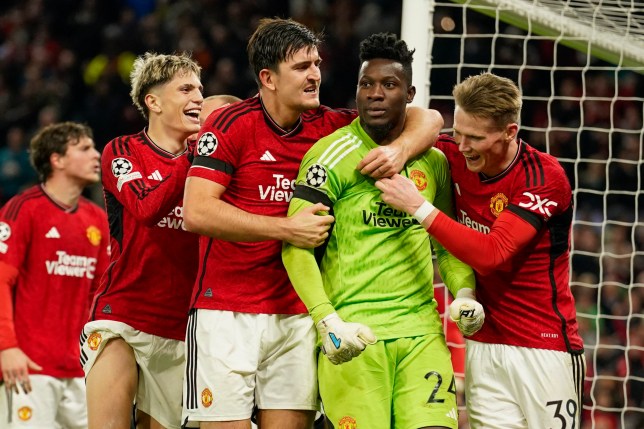Manchester United winger Alejandro Garnacho is at risk of facing disciplinary action following a deleted social media post in which he paid tribute to Andre Onana using controversial emojis.
The drama unfolded after goalkeeper Andre Onana played a pivotal role in Manchester United’s recent victory, sealing a 1-0 win over FC Copenhagen in the Champions League. Onana’s penalty save in injury time proved to be the game-changer, and it didn’t go unnoticed by United players, including Alejandro Garnacho.
In an attempt to acknowledge Onana’s heroics, the 19-year-old Garnacho posted a tribute on social media. However, this gesture quickly turned controversial as Garnacho included two gorilla emojis alongside a picture of himself celebrating with the goalkeeper. Following a wave of backlash and criticism, Garnacho edited the post by removing the gorilla emojis but kept the image on his timeline before ultimately deleting it.
This post initially appeared on social media platform X just after midnight UK time and remained visible for approximately 15 minutes before its deletion.
The potential consequences for Garnacho are significant, as the Football Association (FA) is likely to interpret this post as an ‘aggravated breach’ of its rules governing social media behavior. In a similar instance in 2020, Edinson Cavani, while playing for Manchester United, faced disciplinary action. He received a three-match ban, a £100,000 fine, and was required to undergo a training course after he used the Spanish term ‘negrito’ in a reply to a friend’s Instagram message. The term translates to ‘black,’ and Cavani promptly deleted the post, issued an apology, and vehemently expressed his opposition to racism.
The FA’s rules on social media posts categorize cases involving comments on social networking sites under FA Rule E3(1). If these comments include references to a person’s ethnic origin, color, race, nationality, faith, gender, sexual orientation, or disability, they are regarded as ‘aggravating factors,’ and FA Rule E3(2) may apply. This allows a Regulatory Commission to consider imposing a doubled sanction.
Participants are held responsible for any posts on their accounts, even if a third party made them. Additionally, retweeting an improper comment made by another person can result in disciplinary action. Deleting an inappropriate post, while advisable, does not necessarily prevent disciplinary action from being taken.
